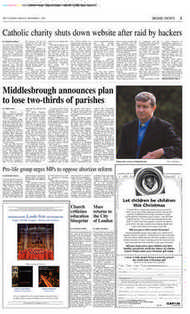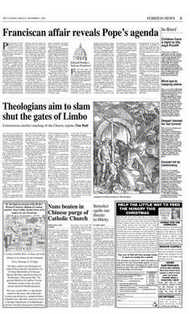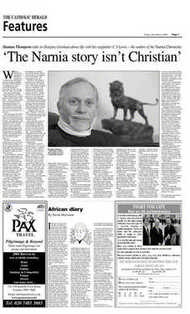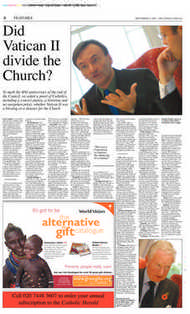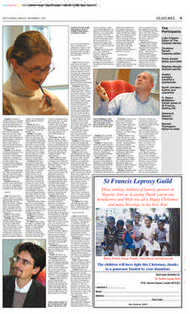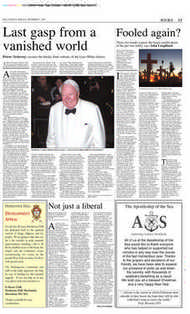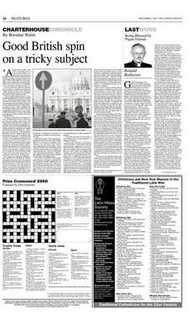Page 5, 9th December 2005
Page 5
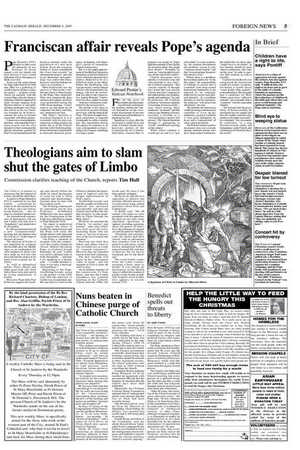
Report an error
Noticed an error on this page?If you've noticed an error in this article please click here to report it.
Tags
Share
Related articles
Limbo In Limbo
Vatican Prepares To Let Go Of Limbo
Pope Places ‘limbo’ Under Scrutiny Of Vatican Theological...
Unbaptised Babies
In Limbo
Theologians aim to slam shut the gates of Limbo
Commission clarifies teaching of the Church, reports Tim Hall THE VATICAN is poised to announce that the concept of Limbo should be abolished.
A report to Pope Benedict XVI is expected to say that Limbo — considered by many to be the eternal home of babies who die before being baptised — has no place in modern Catholicism.
An international commission of theologians will say that Limbo was only ever a “hypothesis” and should now be discarded.
It will recommend instead a new “compassionate” doctrine that all children who die will do so “in the hope of eternal salvation”.
The doctrine of Limbo is not supported by scripture but has held since the Middle Ages as an explanation for what happens to those who have done no evil but who have not had the chance to be freed from original sin by Christ.
As well as unbaptised babies, Plato, Moses and other good souls who lived before Jesus were also said to be living indefinitely in Limbo.
However, Pope John Paul II did not support the teach ing and shortly before his death he asked theologians to come up with a “more coherent and illuminating” doctrine more in tune with the modern world.
The 30-strong commission he appointed, led by San Francisco Archbishop William Levada, now prefect for the Congregation of the Faith, has submitted its report to Pope Benedict XVI.
The report is understood to suggest the doors of Limbo be closed forever and the Pope will study the details before a full statement on the question is published.
The Pope is unlikely to disagree with the commission that Limbo should be closed. Before becoming Pope, as Cardinal Joseph Ratzinger, he said: “Limbo was never a defined truth of faith. Personally — and here I am speaking as a theologian — I would abandon it, since it was only a theological hypothesis.” Reporting to the Pope, Archbishop Levada, acting as the prefect of the CDF, said that the question of Limbo was an important one. He said that it is vital for the Church to balance the importance of baptism with the proper representation of God’s mercy.
Archbishop Levada said that the number of babies not baptised has increased considerably and that the Church must reflect the fact that salvation “is only reachable in Christ through the Holy Spirit”.
However, he said that the Church, “as mother and teacher”, must also reflect how God saves all souls, including those who are weak or “not yet in possession of the use of reason and freedom”.
Doctrine has held that babies and others fated to stay in Limbo live in a state of “natural happiness”. However, they are separated forever from God’s presence.
The new doctrine will focus on the “theological value of hope”, and the strength of God to draw all souls to him.
An Australian member of the commission, Fr Tony Kelly, said that the Limbo hypothesis was common teaching in the Catholic Church until the 1950s, but in the past 50 years it has been quietly dropped.
However, he said that it is important to address the doctrine officially because it is connected to many central questions about God and Catholicism.
Fr Kelly said: “We all smiled a bit when we were presented with this question, but then we saw how many important questions it opened, including questions about the power of God’s love, the existence of original sin and the need for baptism.
“Pastorally and catechetically the matter had been solved, with an affirmation that somehow God in his great love and mercy would ensure unbaptised babies enjoyed eternal life with him in heaven, but we had to backtrack and do the theology.” The word Limbo comes from the Latin Limbus, meaning a hem, edge or border. It was chosen by theologians in the Middle Ages to reflect the location of Limbo on the border of hell. The English word Limbo first appears in records around 1378.
blog comments powered by Disqus




